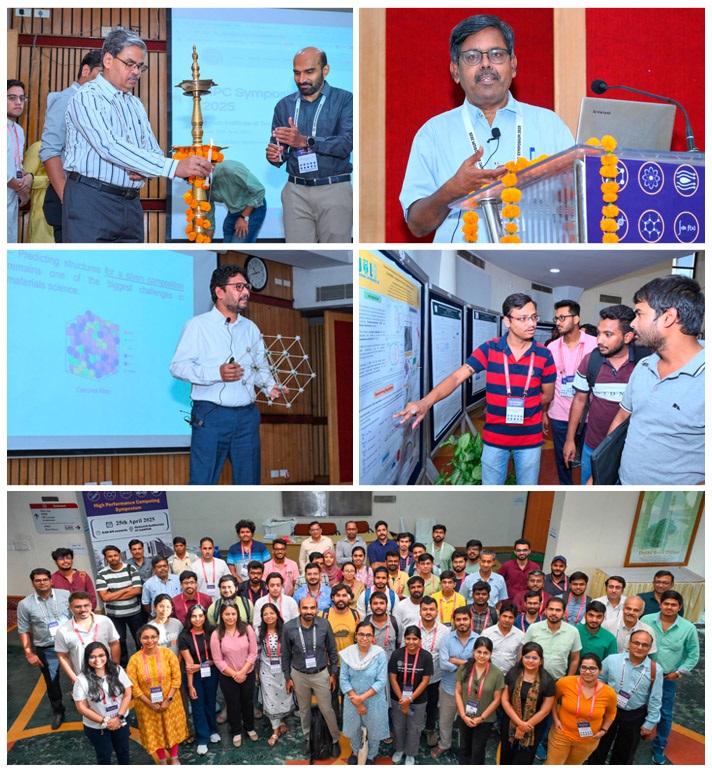Kanpur, 28 April 2025 | The Indian Institute of Technology Kanpur (IIT Kanpur) organized a High Performance Computing (HPC) Symposium, providing a platform for HPC users from various branches of science and technology to come together, present their research findings, exchange ideas, and deliberate on the future of computing. The event featured an impressive lineup of speakers from both academia and industry.

The day-long event was inaugurated by Prof. Braj Bhushan, Deputy Director of IIT Kanpur, with the ceremonial lighting of the lamp. Dr. Hemant Darbari, Mission Director of the National Supercomputing Mission (NSM), delivered the keynote address on the topic “Satiate Futuristic Research Through Insatiable Computation.” He outlined the scientific advancements enabled by the National Supercomputing Mission, highlighted key milestones achieved under the initiative, and shared future plans. Dr. Darbari also discussed how the mission has addressed several grand challenges and contributed to solving critical societal issues, such as accurate weather prediction.
Prof. Braj Bhushan, sharing his views, said, "HPC is a unique facility at IIT Kanpur; not many institutes in India have such an infrastructure. As we move towards data-driven research, which involves handling voluminous datasets, highly efficient systems are essential. Consequently, there is a growing demand for GPUs that can process large amounts of data swiftly. Over 350 faculty members and researchers at IIT Kanpur utilize this facility, which is in great demand. More than 70 research groups at the institute make use of the facility, resulting in over 400 journal publications in the past five years, which is truly remarkable."
Prof. Nisanth Nair, the Dean of Digital Infrastructure and Automation, shared his views on the symposium. He said, "We have two powerful computers that are getting outdated. The demand for computing has increased exponentially over the last few years as AI tools are used in almost all disciplines. We are happy to announce that we will soon get a 5 Petaflops system, which is about 4 times more powerful than the current one. The new system will also be equipped with GPUs, which will enable HPC+AI computing in the future."
The symposium's first session began with Prof. Ramasubbu Sankararamakrishnan from the Department of Biological Sciences and Bioengineering (BSBE), IIT Kanpur, presenting on the transportation of water molecules through protein channels. Prof. D.L.V.K. Prasad from the Department of Chemistry, IIT Kanpur, discussed how he leveraged data mining for materials discovery.
Prof. Rajesh Ranjan from the Department of Aerospace Engineering, IITK, spoke about designing transport vehicles such as bullet trains through computational methods. Prof. Somnath Bhowmick from the Department of Materials Science and Engineering, IITK, shared how he applied machine learning tools for the discovery of novel materials. Addressing the grand challenge of converting methane to hydrogen without producing carbon dioxide, Prof. Vishal Agarwal from the Department of Chemical Engineering, IITK, presented computational methods developed by his team. Prof. Amit Kumar Agarwal demonstrated how high-performance computing has enabled his research group to explore new physics in quantum materials. Prof. B.V. Rathish Kumar from the Department of Mathematics and Statistics, IITK, presented on the development of new computational methods for accurate cyclone prediction.
Towards the end of the symposium, a panel discussion was held, moderated by Prof. Sanjay Mittal, featuring panelists Prof. Mainak Chaudhuri, Prof. Nisanth Nair, Prof. Ashoke De, Prof. B.V. Rathish Kumar, and Dr. Sheshashayee R. This session offered valuable insights from seasoned researchers. A quiz session, conducted by Prof. Preeti Malakar and Prof. Gopal Hazra, added an engaging dimension to the symposium. The event concluded with the distribution of awards to the winners of the quiz and the best HPC image competition.
IIT Kanpur has been a pioneer in high-performance computing (HPC) since its early days, beginning with the IBM 1620 — the first HPC system to be installed in an academic institution in India.
About IIT Kanpur:
The Indian Institute of Technology Kanpur, established in 1959, holds the distinction of being recognized as an Institute of National Importance by the Government of India through an Act of Parliament. Renowned for its excellence in science and engineering education, IIT Kanpur has made significant contributions to research and development over the decades. Its expansive, lush green campus spans 1,050 acres and hosts a rich array of academic and research resources. The institute comprises 19 departments, 26 centers, three interdisciplinary programs, and two specialized schools across engineering, science, design, humanities, and management disciplines. With over 590 full-time faculty members and more than 9,500 students, IIT Kanpur continues to be a leader in fostering innovation and academic rigor.
For more information, visit www.iitk.ac.in.











